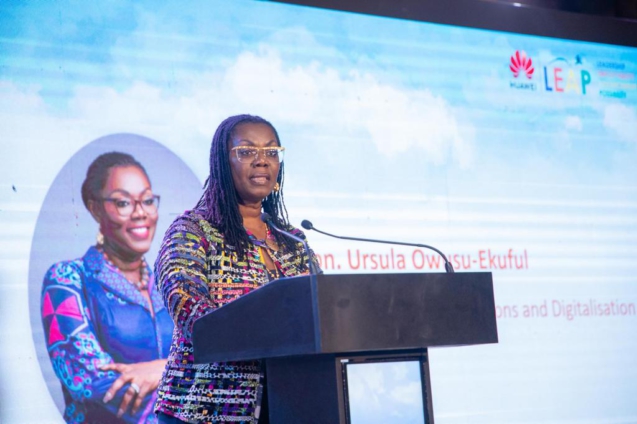The government of Ghana is currently working on to deploy ‘Big Data’ to rationalise the collection, processing, storing and sharing of data among government agencies.
This is expected to be the next major jump in the journey to completely digitise the Ghanaian economy.
According to Minister of Communications and Digitalisation, Ursula Owusu-Ekuful, ‘Big Data’ is expected to come with the needed data analytics platform which will help make proper sense of all the data being mined across government.
It will also help government track trends across the ecosystem, make projections based on data modelling techniques that will be critical for decision making across the spectrum.
Speaking at the World Development Report by the World Bank, Mrs. Ursula-Ekuful said ‘Big Data’ architecture also takes into consideration the data generated and stored within the private sector to ensure that there is seamless sharing of data across both private and public sectors.
She explained further that the ‘Big Data’ regime is expected to bring transparency and efficiency in the way data is utilized.
“The built-in artificial intelligence component will ensure real time update of the different models for different stakeholders. Government will then be able to make policy decision based on data science and communicate effectively to citizens who would have access to the same data. This should improve on the trust relationship between government and citizenry”.
“One of the most important outlooks of this initiative is the real and accurate information to the business community from the staples of government. The business community can make targeted investments in critical, high growth sectors of the economy where return on investment is high to enable economic growth”, she added.
Some identified sectorial models for the Big Data programme include Big Data for Healthcare, Big Data for Agriculture, and Big Data for Governance, Big Data for Trade and Bid Data for Security. Other are Big Data for Education, Big Data for Finance, big Data for Disaster Management and Big Data for recreation.
Sharing of real time information is also expected to improve security across the country as the security and intelligence agencies can target scarce resources to where it is needed most based on timely and accurate data.
Ursula Owusu-Ekuful said the partnership between development partners, civil societies and government is expected to improve as there will be more reliable and uniform data across all sectors of the economy readily available in the governance process.
On the commercial side, she pointed out government is looking to model a regulated commercial framework around big data.
This will encourage institutions, both private and public, to generate more data.
The Data Exchange Hub: will provide the infrastructure, protocols and framework for data sharing across public and private sectors. It will provide the needed APIs to integrate with critical government systems to provide data input in real time, the cost of data (hits) and the use of the data that is accessed will be managed through the data governance framework to minimise data abuse and privacy issues.
Data Governance Framework: The Big Data initiatives is expected to be deployed with a data governance framework which will define data value, data exchange protocols, security channels and protocols, data governance hierarchy, data exchange dispute resolution protocols, etc.
Rural Telephony Project for Connectivity: The underlying infrastructure to ensure that government get more value out of this data ecosystem it is building. GIFEC through the rural telephony project is extending connectivity to the most rural part of the communities with shared community base stations to allow all telco providers to be able to provide services to the rural folks without the CAPEX overhead on the part of the telco providers. This will facilitate access to the data ecosystem.
Ghana Card Integration for Identity of Persons and Corporates: The ongoing integration of the Ghana Card as the identity platform for persons across the ecosystem is part of the effort to sanitise, standardise and share data across the ecosystem. The Ghana Card is providing single identity services to persons whiles RGD is expected to provide single identity to institutions and companies across the ecosystem to build trust. This government believes will help in the standardisation of data across all platforms.
Latest Stories
-
DAMC, Free Food Company, to distribute 10,000 packs of food to street kids
24 minutes -
Kwame Boafo Akuffo: Court ruling on re-collation flawed
44 minutes -
Samuel Yaw Adusei: The strategist behind NDC’s electoral security in Ashanti region
46 minutes -
I’m confident posterity will judge my performance well – Akufo-Addo
58 minutes -
Syria’s minorities seek security as country charts new future
2 hours -
Prof. Nana Aba Appiah Amfo re-appointed as Vice-Chancellor of the University of Ghana
2 hours -
German police probe market attack security and warnings
2 hours -
Grief and anger in Magdeburg after Christmas market attack
2 hours -
Baltasar Coin becomes first Ghanaian meme coin to hit DEX Screener at $100K market cap
3 hours -
EC blames re-collation of disputed results on widespread lawlessness by party supporters
3 hours -
Top 20 Ghanaian songs released in 2024
3 hours -
Beating Messi’s Inter Miami to MLS Cup feels amazing – Joseph Paintsil
3 hours -
NDC administration will reverse all ‘last-minute’ gov’t employee promotions – Asiedu Nketiah
4 hours -
Kudus sights ‘authority and kingship’ for elephant stool celebration
4 hours -
We’ll embrace cutting-edge technologies to address emerging healthcare needs – Prof. Antwi-Kusi
4 hours

